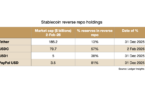The Central Bank of Nigeria launched the eNaira central bank digital currency (CBDC) pilot in October 2021. Despite being a pilot, it is fully open to the public, although it was only available to bank account holders initially. According to the Nigerian BusinessDay, only 80 merchants are currently active, citing a lack of demand. The newspaper says the figures came from a central bank chart.
While there have been 764,000 eNaira app downloads, almost half have never used the app. The central bank has onboarded less than a third of the downloaded figure, and 168,300 of the accounts are active. However, just 18,460 have funded wallets, including the 80 merchants. The newspaper reported that merchants say they rarely get requests to use the app. We contacted the central bank to confirm the figures but didn’t receive a response in time for publication.
Nigeria has a large population of 211 million, with 70% of that figure under the age of 30. However, a significant proportion is minors. More than 110 million citizens have bank accounts.
Article continues …

Want the full story? Pro subscribers get complete articles, exclusive industry analysis, and early access to legislative updates that keep you ahead of the competition. Join the professionals who are choosing deeper insights over surface level news.






